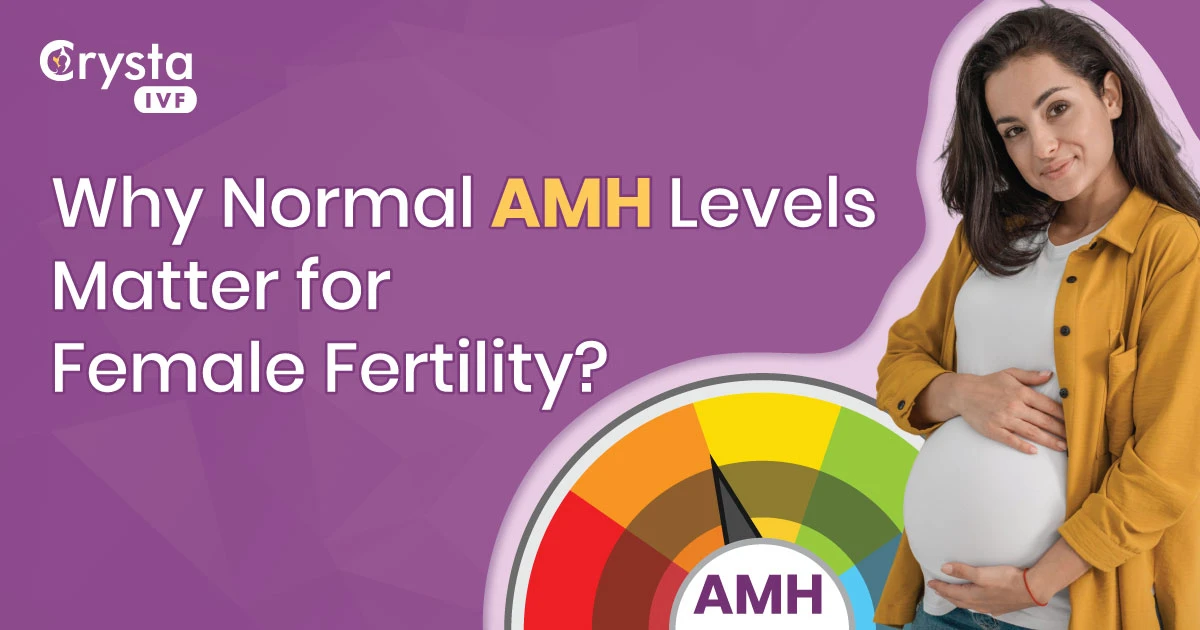It’s very important to understand your reproductive health, especially when you are trying to get pregnant. Several hormones, such as estrogen, progesterone, oxytocin, hCG, etc., are crucial during pregnancy. One such hormone is AMH, and knowing its level is important when trying to conceive. AMH is a protein hormone generated by ovarian follicles and tells the amount of eggs the female has left to produce. Hence, the families must know Normal AMH levels to make informed decisions about their future.
Even while AMH levels normally decrease with age, staying within a normal range is frequently linked to a higher chance of getting pregnant. Read this article to learn what AMH is, what the normal AMH level is, and how it relates to pregnancy.
Understanding AMH Hormone
To understand the importance of the AMH Test, you must first know what AMH hormones are. AMH stands for anti-Mullerian hormone, which is secreted by folliculars in the ovaries of a female body.
- This hormone is produced by the follicular cells in females
- The amount of eggs a woman produces is directly correlated with her AMH level
- During pregnancy, AMH is essential for the development of the sex organs in the developing infant in the uterus.
- Girls’ AMH levels begin to rise steadily at birth and reach their peak at age 25.
- After puberty, the follicle pool shrinks with aging and becomes undetectable during menopause, resulting in low AMH levels.
- Research shows that AMH levels and the number of retrieved oocytes during an ovarian stimulation cycle are correlated, which helps predict an individual’s ovarian response during in IVF Treatment.
Where Does AMH Come From?
The follicle-stimulating hormone (FSH) is produced in the brain and causes ovarian follicles to
develop and enlarge. An egg is present inside each follicle, which produces AMH.
Also, the number of developing follicles in each menstrual cycle correlates with the blood (AMH). Hence, AMH level indicates the number of eggs a woman has in her ovaries.
AMH Hormone Test in Females
An AMH test determines the blood level of anti-Mullerian hormone (AMH). Healthcare professionals or IVF doctors commonly administer the test to women, mostly to give a quick overview of their reproductive health.
Normal AMH Levels in Females Based on Age
AMH levels begin to drop at every female mid-age and eventually get to their lowest point during menopause. Women’s normal AMH levels range from 1 to 4 ng/mL.
There are no standard AMH levels registered until now. Your doctor can tell you different range
groups according to your age. However, Cleveland Clinic states the standard AMH levels by
Age followed by most of the doctors involved.
The Cleveland Clinic states that appropriate AMH values for each age group are:
| AGE | Optimal Range |
| 20 – 25 years | >3 ng/ml |
| 26 – 30 years | >2.5 ng/ml |
| 31 – 35 years | >1.5 ng/ml |
| 36 – 40 years | >1.0 ng/ml |
| 40 – 45 years | >0.5 ng/ml |
What Does an AMH Tell You?
With the help of an AMH test, the doctors can find out how many eggs you still have in your
ovaries. The results are compared with the standard AMH chart by age, after which the doctors
can predict and confirm that your chance of getting pregnant is at what stage.
Also, an AMH test can show how your eggs will respond in correspondence to the fertility
medicines for IVF.
What Does an AMH Can’t Tell You?
Even though AMH and egg count are related, AMH does not predict fertility or the timing of
menopause.
Additionally, remember that other factors may affect your ability to conceive even if your AMH
levels are within the normal range. Examples of these factors include:
● Age
● Health issues
● Smoking and Drinking
● Sperm motility and count
● Irregular periods
● Endometriosis,
● Obstructed fallopian tubes
● Abnormalities in uterus
Why is it Important to Test AMH in Females?
There are various reasons why doctors suggest an AMH test. Some reasons include:
- To know if a female’s egg production is stable or decreasing
- For diagnosis of specific problems that influence ovarian reserve
- To predict ovarian response in female patients receiving reproductive treatment
- It can provide information regarding the success rate of IVF
What is a good AMH level for getting pregnant?
It is thought that having AMH levels between 2.0 and 4.0 ng/ml is a good or normal range for
getting pregnant. A low AMH level means Low egg count & declining ovarian reserve.
When sperms are fused with your eggs, Embryos are formed. It’s generally stated that the number of eggs you produce increases your chances of developing and creating a healthy number of embryos in IVF for transfer. However, only some eggs you produce are effectively fertilized during in vitro fertilization.
The proportion of your aberrant eggs that result in aberrant embryos increases as you grow old.
Therefore, you will create fewer healthy embryos from the fewer eggs you produce.
Hence, a decreased number of AMH levels lowers the success rate of IVF. Women are more
likely to face such issues, particularly if the females are in their late 30s.
5 Reasons that Disturbs AMH Hormone Levels in Females
Age
The primary factor influencing the alteration in AMH levels is age. From birth, all women have an unlimited supply of immature eggs. These eggs develop into mature ones utilized during ovulation cycles for the duration of a woman’s life, up to menopause. As a woman ages, her AMH level declines since her ovarian reserve diminishes.
Poor Diet
High-processed foods and fat diets are considered poor for AMH levels. Poor eating habits lead to obesity, which in turn produces low levels of AMH and other reproductive problems. Additionally, some research indicates that low vitamin levels, particularly Vitamin D, directly affect AMH levels and fertility. Therefore, eating a balanced diet is recommended to achieve optimal levels of AMH.
Mental & Emotional Health
Stress is one of the major factors that lowers AMH levels. Emotional stability and mental health are always advantageous, especially for women who are attempting to get pregnant. Infertility may arise from a constant state of mental stress or hypertension. Additionally, lowering stress and keeping a calm mind might raise AMH levels.
Contraceptive Pill
Long-term use of Birth control pills can reduce ovarian reserve. When compared to non-users, normal women who take OCP (Oral Contraceptive Pill) have reduced real AFC (Antral Follicular Count) and AMH.
Smoking
It has been observed that women who smoke have decreased follicular counts, low AMH, and poor egg quality. The quantity of cigarettes smoked each day has an impact. Women who smoke a lot are generally more likely to reach their menopause at an earlier age.
What Can Women Do to Optimise AMH Level?
Numerous circumstances influence ovarian reserve, AMH levels, and egg quality. Women must
practice dietary modifications, lifestyle adjustments, and supplements to optimize their AMH
levels.
Eat Enough Nutrients
Your diet supplies the nutrients needed to form a baby inside your womb. Food also provides
antioxidants to protect fragile eggs and fuel for hormone balance. Make sure you are following a
good, nutritious diet. Start eating whole foods that are high in nutrition.
What you consume does affect your AMH level. This implies that you can modify your diet to
enhance AMH.
Lifestyle Modifications
Other lifestyle modifications also contribute to increased AMH and fertility apart from diet.
It’s interesting to note that several studies have indicated that a pregnant woman’s behaviors,
particularly her coffee consumption, may determine her daughter’s AMH level. Your lifestyle,
physical activity, eating pattern, and stress and anxiety can affect your AMH level.
Smoking & Drinking
Research has stated that smoking cigarettes descreases AMH levels. According to a 2010 study, the
AMH levels of late-reproductive-age smokers were 44% lower than those of non-smokers.
However, long-term heavy smokers have low ovarian reserve.
Another substance that may have an impact on fertility is alcohol. Alcohol may raise estrogen
levels and lower progesterone formation, interfering with the balance of hormones. Regularity of
the menstrual cycle and ovulation are impacted by alcohol usage.
Stress Management
Stress is known to have an impact on menstruation and hormones. Current research indicates
that AMH levels are impacted by stress. The higher stress levels result in lower AMH levels in
women seeking reproductive treatment.
Starting a fertility journey can be stressful, so it’s crucial to focus on relaxing your nervous
system and taking care of yourself during this time.
Be Informed & Don’t Worry!
Age-related declines in AMH levels are not controllable by the women. Hence, deciding to
undergo IVF at an appropriate time is crucial.
Suppose you have been trying to have a baby for a long time but still have no positive results. In
that case, you must immediately consult an experienced fertility specialist at Crysta IVF. Our
doctors will run certain tests and give personalized solutions based on your problems.
Remember! Your AMH test does not determine your fertility or indicate how likely you are to
conceive spontaneously. It only tells you about the quantity of the egg you produce. Be Informed!
FAQs
Ques. What is a good AMH level for getting pregnant?
An AMH level between 1.0 and 4.0 ng/mL is considered good for getting pregnant.
AMH (Anti-Müllerian Hormone) levels indicate a woman’s ovarian reserve.
A level within this range generally suggests a healthy number of eggs, which can improve chances of conception.
Ques. What are normal AMH levels by age?
Normal AMH levels vary by age:
- Age 20-29: 3.0 – 7.0 ng/mL
- Age 30-34: 2.5 – 6.0 ng/mL
- Age 35-39: 1.5 – 4.0 ng/mL
- Age 40-44: 0.5 – 2.5 ng/mL
But usually, these AMH levels naturally decline with age as the ovarian reserve decreases which makes the pregnancy difficult.
Ques. What is a normal AMH level in PCOS?
In PCOS, AMH levels are often higher than 4.0 ng/mL. Women with PCOS usually have a higher count of small follicles, which results in elevated AMH levels. An AMH above 4.0 ng/mL is common in PCOS.
Ques. Can I conceive with low AMH?
Yes, it is possible to conceive with a low AMH, but it may be more challenging. Low AMH means a reduced egg reserve, but it doesn’t rule out pregnancy.
Fertility treatments like IVF and IUI can help, and some women naturally conceive despite low AMH. Always consult a good fertility expert if you are facing low AMH and trying to get pregnant for a long time.
Ques. Can AMH drop in 6 months?
Yes, the AMH levels can decrease within 6 months. AMH levels naturally decline as a woman ages, and factors like stress, lifestyle changes, or medical conditions can speed up this drop.
Ques. What is a bad AMH level?
There is nothing like a bad AMH, but an AMH level below 0.5 ng/mL is considered low or poor for getting pregnant.
Such levels indicate a significantly reduced ovarian reserve, making natural conception more difficult. It’s often a sign of declining fertility.
Ques. Which food increases AMH level?
Foods rich in antioxidants, vitamins, and healthy fats may support ovarian health. Consuming leafy greens, berries, nuts, seeds, and foods high in omega-3s like fish can help maintain ovarian function.
Ques. How do I increase my AMH level?
There’s no proven method to increase AMH, but maintaining a healthy lifestyle may help to maintain the level.
Eating balanced meals, managing stress, and avoiding smoking can support overall reproductive health. However, some doctors also suggest taking supplements like DHEA and CoQ10.
Ques. Can low AMH cause twins?
No, low AMH does not increase the chances of twins. Twin pregnancies are more related to genetics or fertility treatments rather than AMH levels.
Low AMH usually indicates fewer eggs rather than a higher chance of multiple eggs releasing.
Ques. What is AMH test price?
The cost of an AMH test in India ranges from ₹1,500 to ₹5,000. The prices vary depending on the lab, city, doctor’s fees and any additional testing included. It’s best to check with clinics and diagnostic centers for accurate pricing.




